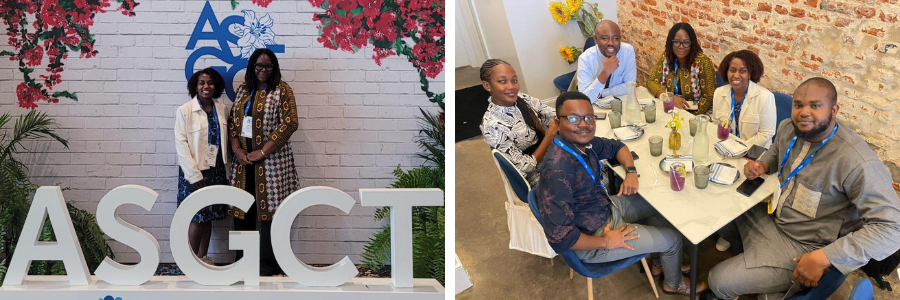Cell and Gene Therapy in Africa: Reflections on My ASGCT Journey
Irene Honam Tsey, PhD - July 16, 2025
Irene Honam Tsey, a research fellow at the University of Health and Allied Sciences (UHAS) in Ghana, attended the 2025 ASGCT Annual Meeting in New Orleans in May.

My journey into gene and cell therapy began with the ASGCT’s Global Gene Therapy Training, a program delivered in collaboration with the Muhimbili University of Health and Allied Sciences in Tanzania. A few months later, I was honoured to be selected as one of only six recipients of the 2025 ASGCT Global Outreach Travel Stipend, which allowed me to attend the Annual Meeting in New Orleans. It felt like a door of new opportunities swinging open.
My interest in this field was first ignited by my PhD research, which explored the ethical, legal, and social implications (ELSIs) of genomic research in Sub-Saharan Africa. The online training offered a solid technical foundation, but the in-person experience at the Annual Meeting elevated everything to a new level. One session that left a lasting impression was organized by the Ethics Committee and focused on the ethical dimensions of genetic testing. These discussions were not abstract or distant but resonated deeply with the real-world challenges.
Being physically present at the meeting enabled me to engage directly with experts, observe real-world innovations, and better understand the current state of the field. Walking through the exhibition booths and interacting with companies offering cutting-edge tools and therapies was both exciting and sobering. It highlighted just how far Africa must go to become a full participant in the global gene and cell therapy ecosystem.
The most transformative aspect of the experience was the mentorship aspect. I was paired with a mentor from ASGCTs Global Outreach Committee, who not only guided me in selecting sessions aligned with my interests but also engaged me in rich, thoughtful conversations about the state of gene and cell therapy in Africa. These discussions evolved into a collaborative project: a paper that will assess the regulatory landscapes of Ghana and Tanzania in comparison with frameworks like that of the United States. A fellow mentee from Tanzania will also co-author the paper, marking the beginning of what I hope will be a long-term African knowledge exchange.
Since returning home, I have begun translating what I have learned into tangible action. At the University of Health and Allied Sciences (UHAS) in Ghana, where I am a research fellow, I have initiated conversations with colleagues in biomedical and medical laboratory sciences to explore joint research projects. I have also integrated gene and cell therapy into my mentorship of students through our university’s students’ research club. In a recent session on the responsible use of artificial intelligence, I introduced gene and cell therapy as an emerging health technology to broaden students’ perspectives. Plans are currently underway to organize a webinar featuring ASGCT mentees from across Africa. Thanks to the WhatsApp group we created during the meeting, we now have a vibrant, cross-continental network to exchange ideas and launch collaborations.
I am deeply grateful to ASGCT and to my mentor for making this experience so impactful. It reaffirmed my belief that while science fuels innovation, it is people and the connections they build that drive lasting change. I look forward to contributing to the growing conversation on gene and cell therapy, especially its ethical, legal, and social implications for Africa’s unique context.
Related Articles